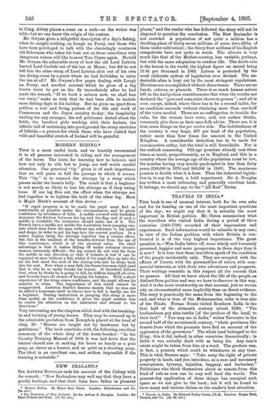TRAVELS IN INDIA.*
Tins book is one of unusual interest, both for its own sake and for its bearing on one of the most important questions of the day ; we might say that it is actually the most important in British politics. Mr. Oaten summarises what the travellers who visited India during a period of three centuries (1400-1700) recorded of their impressions and experiences. Such information would be valuable in any case; in view of the Indian problem with which Britain is con- fronted it is of the very highest importance. The great question is,—Was India better off, more wisely and humanely governed, happier and more prosperous, in those days than it is now P It is true that these travellers speak of the condition of the people incidentally only. They are occupied with the affairs of Courts, with the personalities of rulers, with com- mercial interests, or with their own adventures and prospects. Their writings resemble in this respect all the records that we possess. All that we know about the life of the people, as distinct from politics and war, we have to discover in this way. And it is the more trustworthy on that account, just as we can rely on circumstantial more implicitly than on direct evidence. The story is practically the same from the beginning to the end, and what is true of the Mohammedan ruler is true also of the Hindu. Fernao Nuniz visited Southern India in the first half of the sixteenth century (about 1530). "The husbandmen pay nine-tenths [of the produce of the land] to their lord." "You may see in India," writes Tavernier in the second half of the seventeenth century, "whole provinces like deserts from which the peasants have fled on account of the oppression of the governors." The whole land belonged to the King; this it did, indeed, in other countries theoretically ; in India it was actually dealt with as being his. Any man's estate might be taken from him at a word. The produce was, in fact, a pension which could be withdrawn at any time. This is what Bernier says : "Take away the right of private property in lands, and you introduce, as a sure and necessary consequence, tyranny, injustice, beggary, and barbarism." Politicians who think themselves about as remote from this kind of rule as men can be may well heed the words. The present-day application of these things has occupied such space as we can give to the book ; but it will be found to have many and various claims on the reader's best attention.
• Travels in India. By Edward Farley Oaten, LL.B. London: Kagan Paul, Trench, and Co. [3e. 6d, net.]






































 Previous page
Previous page